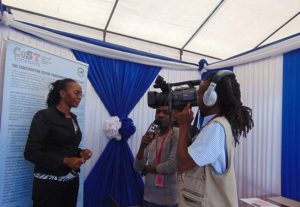Member from 2012 to 2022

In Tanzania, issues surrounding corruption dominate the national agenda: this relates especially to the realm of infrastructure, as it is an area that is particularly prone to financial mismanagement and corruption risks. According to Transparency International’s Corruption Perceptions Index 2018, Tanzania scored 36/100. It was ranked 99th out of 180 countries globally: Tanzania’s score has continued to improve steadily since 2015. The World Bank’s Worldwide Governance Indicators 2017 gave Tanzania a percentile rank of 39.4% for the control of corruption.
CoST Tanzania: How it all began
Although the CoST Tanzania programme closed in 2021, Tanzania was one of the eight countries to participate in the CoST pilot study between 2008 and 2010. This looked specifically at how a multi-stakeholder approach could increase transparency and accountability in delivering infrastructure projects. Across the eight participating countries, it assessed a total of 100 projects of varying size, which provide essential public services such as roads, housing, water, flood protection, education, and health. After CoST Tanzania launched in November 2008, a Multi-Stakeholder Group (MSG) was created, which comprised members from government, the private sector, and civil society organisations. Supported by a national coordinator, the MSG carried out three key activities:
- The development of a baseline study to profile the local construction sector, the laws and regulations relating to public administration and transparency, and relevant institutions and initiatives relating to governance. The study also comprised an analysis of key project information from a sample of recently completed infrastructure projects.
- Testing the disclosure process in a few procuring entities, assembling a list of key project information from a sample of current ongoing projects, and publicly disclosing the data.
- Conducting an assurance review of the disclosed project information, identifying causes for concern, and helping stakeholders to understand the main issues.
The CoST Tanzania MSG appointed four assurance teams to collate and analyse project information from six projects across the road, health, water, and education sectors. The teams identified several issues, including inadequate designs prepared before tender and a lack of competition for both the supervision and works contracts.
Multi-Stakeholder Working
CoST brings together stakeholder groups with different perspectives and backgrounds from across government, the private sector, and civil society. Through each member’s Multi-Stakeholder Group, these entities can guide the delivery of CoST and pursue infrastructure transparency and accountability within a neutral forum.
CoST Tanzania was hosted by the National Construction Council, and its MSG was made up of representatives from the government, the private sector, and civil society. CoST Tanzania’s Champion was the Minister for the President’s Office, Public Service Management and Good Governance.
Publication of data
The data publication process ensures that data about the purpose, scope, costs and execution of infrastructure projects is open and accessible to the public, and that it is data is published in a timely manner.
In its operational period, CoST Tanzania influenced the Government through the Public Procurement Regulatory Authority (PPRA) to issue Regulation No. 10(3) of 2013, requiring that all procuring entities submit project information to the PPRA using a predetermined format that used the CoST CoST Infrastructure Data Standard (CoST IDS). The CoST IDS would later be incorporated into the District Roads Management System, which was operated by the Tanzania Rural and Urban Road Agency (TARURA) – one of the key procuring entities involved in large-scale road projects. This was a good indicator of the Government of Tanzania’s support for CoST and high-level acceptance of the CoST IDS.

CoST Tanzania conducted its first independent review process in 2013, which looked at the construction of health facilities in the regions of Mara, Mtwara, and Tabora, and road projects in the Morogoro region and the Tanga region.
In 2017, CoST Tanzania began its second independent review process on two major projects and one water programme in Tanzania. The projects included were the TAZARA Intersection Project and the NSSF Dungu Housing Project. The water programme focused on analysing the Water Sector Report 2016, a government report which assessed all of the water projects managed by the Ministry of Water and implemented between 2006 and 2016. The assurance report found there had been positive achievements in the water sector and that health and safety standards had not been adhered to in the TAZARA intersection project. However, the TAZARA project also highlighted significant issues in the procurement process in Tanzania: all procurement for the project was done in Japan and restricted to Japanese companies. The estimated final cost of the project also increased by more than 60%. Three projects along the Mpanda-Koga-Tabora road were assessed as part of CoST Tanzania’s report in November 2020.
Civic engagement
Social accountability and civic engagement ensures that information on public infrastructure projects is in the public domain. CoST works with stakeholders such as the media and civil society to promote the findings of the assurance process and ensure decision makers are held to account.
In March 2019, CoST Tanzania piloted a monitoring and evaluation exercise with local civil society organisations (CSOs) in two districts of Kilosa and Gairo in Morogoro. In this exercise, the CSOs engaged with the communities alongside constructed roads in the districts to gather their feedback on any issues with the projects.
The exercise highlighted a lack of community involvement throughout the entirety of the planning process. There was a lack of knowledge at the community level about CoST Tanzania and the Tanzania Rural and Urban Road Agency, which is the procuring entity. Uncompensated funds meant there was a possibility of future conflict between the community and the procuring entity. This experience highlighted a need for greater engagement with CSOs, procuring entities, and local communities: facilitating communication between all groups that would limit the likelihood of such conflict arising.
In June 2019, CoST Tanzania presented a paper on “The Essence of Transparency and Accountability in Construction Projects” during the 3rd Africa Ports Expansion, Roads, Bridges and Highways Africa Conference, which was held in Tanzania. In addition, various training sessions were held for procuring entities to promote transparency in publicly funded infrastructure projects.
CoST Tanzania’s membership was declared ‘inactive’. The CoST Board made this decision following a lack of progress in Tanzania. CoST members demonstrate a firm commitment to improving infrastructure transparency and accountability in their various contexts. Throughout their membership, programmes are subject to the CoST performance monitoring policy, and their membership is contingent on the CoST Board being satisfied that meaningful progress is maintained. In accordance with this policy, the CoST Tanzania is ‘closed’, but CoST IS would welcome the country to re-engage and re-apply for membership in the future.
CoST Tanzania assurance reports
Project data for CoST Tanzania assurance process 2013: Ministry of Health
Project data for CoST Tanzania assurance process 2013: Ministry of Health
Project data for CoST Tanzania assurance process 2013: Magol to Turiani
Project data for CoST Tanzania assurance process 2013: Chalinze to Kitumbi
Summary of CoST Tanzania assurance process 2017
CoST Tanzania 2017 Assurance Report: TAZARA Intersection Project
CoST Tanzania 2017 Assurance Report: Dungu Satellite Village Project
End of membership
CoST Tanzania became an inactive member in July 2020, and a year later (May 2021), the membership was officially withdrawn by the CoST Board following the applicable policies. If circumstances change, the Government of Tanzania, alongside its civil society and private sector partners, is welcome to re-apply to join CoST.